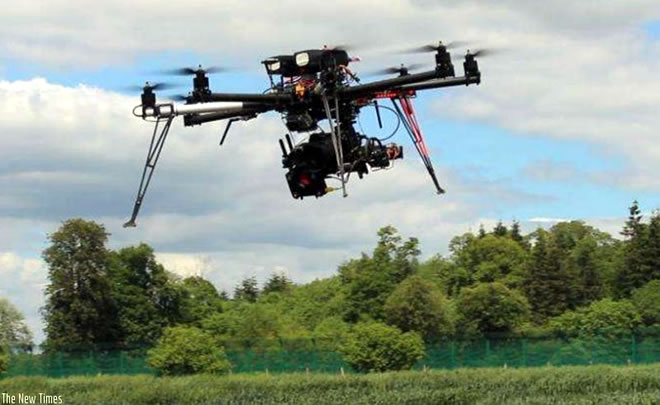
By: Collins Mwai
Thursday, October 15, 2015

Drone technology is now used for various functions, including photography as in this picture. (File)
The government has moved to set up a regulatory framework for remotely piloted aircraft, popularly referred to as ‘drones,’ following investor interest to establish the world’s first drone airport (drone port) in the country beginning next year.
In their proposal, the investors said, beginning next year, they intend to begin construction of three drone ports, which will take about four years to complete.
To facilitate the planned development, Rwanda Civil Aviation Authority (RCAA) is in the process of drafting regulations that will soon be submitted to Cabinet for approval and to be made operational by 2016.
The authority found it important to have the framework in place to guide further developments in the technology, which is fast becoming popular, as well as other aspects such as port construction.
RCAA public relations officer Tonny Barigye told The New Times that the overall aim was to ensure that the uptake of the technology was done in a secure, safe and efficient manner.
“As soon as the regulations are in force, Rwanda will be able to regulate any projects related to remotely piloted aircraft systems including and not limited to drone operations and all infrastructure required,” Barigye said.
The process involves consultations with stakeholders in the aviation industry and is also guided by the international civil aviation guidelines.
Foster’s firm is looking at a facility that will not only be used by Rwanda, but the region as well, with plans of expansion to the entire continent.
In remarks that accompanied his proposal and project implementation plan, the architect said, like mobile phones-dispensed landlines, cargo drones can get past geographical barriers such as mountains, lakes and rivers without much need for physical infrastructure.
“An ‘infrastructural leap’ is essential using drone technology and clean energy systems to surmount the challenges of the future,” Foster said.
The proposal works on estimates that a specialist drone can carry blood and life-saving supplies over 100 kilometres at minimal cost, providing an affordable alternative that can complement other modes of transport.
According to the proposal, Foster’s facility will have two parallel networks; one for medical and emergency supplies, and another for commercial purposes that will transport crucial larger payloads such as spare parts, electronics and e-Commerce.
Subsequent phases of the project could see about 40 drone ports across the continent, with Rwanda’s location considered ideal for easier expansion to neighbouring countries and the entire continent.
Beyond the actual facility, the drone port will create an eco-system around it that could develop into a commercial hub. It will also host a health clinic, a digital fabrication shop, a post and courier room, and an e-Commerce trading hub.
Foster said Rwanda’s challenging geographical landscape had made it an ideal testing ground and model for the drone port project.
He noted that much of the African continent had a gap between the population and infrastructure which at times complicated provision of basics such as medical supplies as well as commercial services.
“The shortage of terrestrial infrastructure has a direct impact on the ability to deliver life-giving supplies, indeed where something as basic as blood is not always available for timely treatment. We require immediate bold, radical solutions to address this issue,” Foster said.
“The drone port project is about doing ‘more with less’, capitalising on the recent advancements in drone technology.”
Francis Gatare, the chief executive of Rwanda Development Board, said Foster’s company has been in discussions with the government to establish the port.
At the moment, the technology is already in use in the country with a few drones functional.
Most of the operational drones presently are used for aerial view photography projects at public events and open spaces such as national parks.